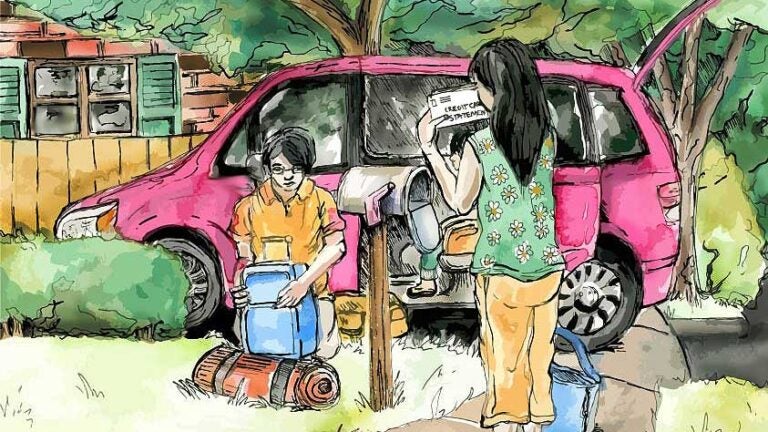
Many people would rather splurge on a special experience rather than buy material goods, USC researchers say. (Illustration/Yasmin Davis)
Study surprise: Experiences (like vacations) win over material goods if credit is how you’re paying
It wasn’t always this way: USC Marshall research shows people now opt for the adventure rather than something that lasts, like a couch
Would you rather go into debt for a stylish leather sofa or a trip to Hawaii?
Previous research has suggested that people are more willing to incur debt for a big discretionary purchase that will last a long time, like furniture, but not for a fleeting experience like a trip. New research from the USC Marshall School of Business turns that accepted notion on its head.
Stephanie M. Tully, assistant professor of marketing at USC Marshall, and a Dartmouth College colleague published their findings in the Journal of Consumer Research.
“When consumers have no source of funding other than debt,” the researchers wrote, “they are more willing to finance experiential versus material purchases.”
Timing is everything
The researchers offered a particular scenario: You’d like to go snorkeling with friends this weekend but don’t have the cash. The option: You can put the trip on a credit card or wait, save the money and go next month.
But you really wanted to go this weekend. And the same trip next month will be a different experience. So you put down the plastic.
In contrast, if you were thinking about buying snorkeling equipment this weekend but don’t have the cash, the thought of waiting until you do isn’t as compelling a reason to reach for a credit card. The equipment is a material purchase. It will be there next week or next month, and you can buy it any time.
“Instead of thinking about how long you’ll have the item, willingness to borrow is more commonly driven by a sense of ‘purchase-timing importance’ — the feeling that the timing of making the purchase is important,” Tully said. “We find that purchase timing is often more important for experiences. That is, because you plan to do something at a specific time, it seems harder to put off making the purchase until you get more money.”
The researchers concluded that offering more financing options for experiential purchases may benefit firms as well as customers. Understanding the importance of purchase timing in discretionary debt is key.
“Firms may encourage consumers to use financing offers instead of delaying a purchase,” they wrote. “For example, focusing consumers’ attention on a particular opportunity for consumption should enhance purchase-timing importance and hence willingness to borrow.”
